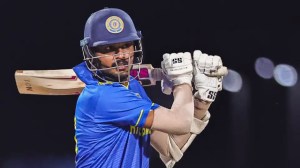Fact and fiction
A scientist defecting to the west and trading nuclear secrets for protection was the stuff of some gripping fiction produced in the Cold War...

A scientist defecting to the west and trading nuclear secrets for protection was the stuff of some gripping fiction produced in the Cold War era. The best of the genre mixed wild flights of the imagination with some of the realities of the nuclear standoff between the US and Soviet Union and placed a universal human dilemma at the heart of the plot. Dr Iftikhar Khan Chaudhury8217;s story of a conscience-stricken young scientist and his colleagues blowing the whistle on an irrational military-political establishment had all the right ingredients to start with for a runaway best-seller. Enter an American lawyer, the FBI and Pakistan8217;s Atomic Energy Commission PAEC and the story-line goes haywire. At present the readers can take their pick of several plots. From Pakistan comes the version that Chaudhury himself is a fiction: no such person exists on PAEC files. The lawyer says it is a heart-wrenching factual event. Conspiracy theorists suspect the CIA, being short on other skills, concocted the plot to embarrassthe new nuclear break-outs, India and Pakistan. A further twist is the possibility of inter-agency wars in the US with the anti-China faction inventing Chaudhury and Co in order to stiffen the US administration8217;s spine.
Mercifully, Indian officials have kept their thoughts to themselves. There are too many loose ends in the story for much credibility to be given to the so-called leaks from within the PAEC about alleged plans for a pre-emptive nuclear strike against New Delhi last April. It is not very probable that junior scientists will be sent to represent their department heads at high-level military planning sessions. Secondly, it is curious that Chaudhury managed to hug his secret to himself right through the period starting before Pokhran-II and extending well beyond Chagai. Curious too that he made his revelations only after he acquired a lawyer. There is bound to be a spin on the facts when one is bargaining for asylum. Altogether, if anyone has anything to worry about from the surfacing ofChaudhury and four other scientists, it is Pakistan and the other countries being cited as aiders and abettors of its nuclear weapons programme. These include China, Iran and Saudi Arabia. All of them must wonder what American intelligence and the administration will make of the information or disinformation.
There is nothing very new or unique about a Pakistani first strike posture. Military experts have known about it for a long time and Pakistani officials have made no secret of their thinking on the subject. It is their means of pre-empting a strike against their nuclear establishments. All this second guessing which is part of nuclear deterrence needs to be sorted out by a military and political dialogue between India and Pakistan with the aim of devising confidence-building measures and preventing misunderstandings. Later this month in Colombo the prime ministers of the two countries will have their first opportunity to start that process. It is up to the political leadership to put matters back on aneven keel and put an end to talk of military scenarios and this or that contingency.
- 01
- 02
- 03
- 04
- 05































